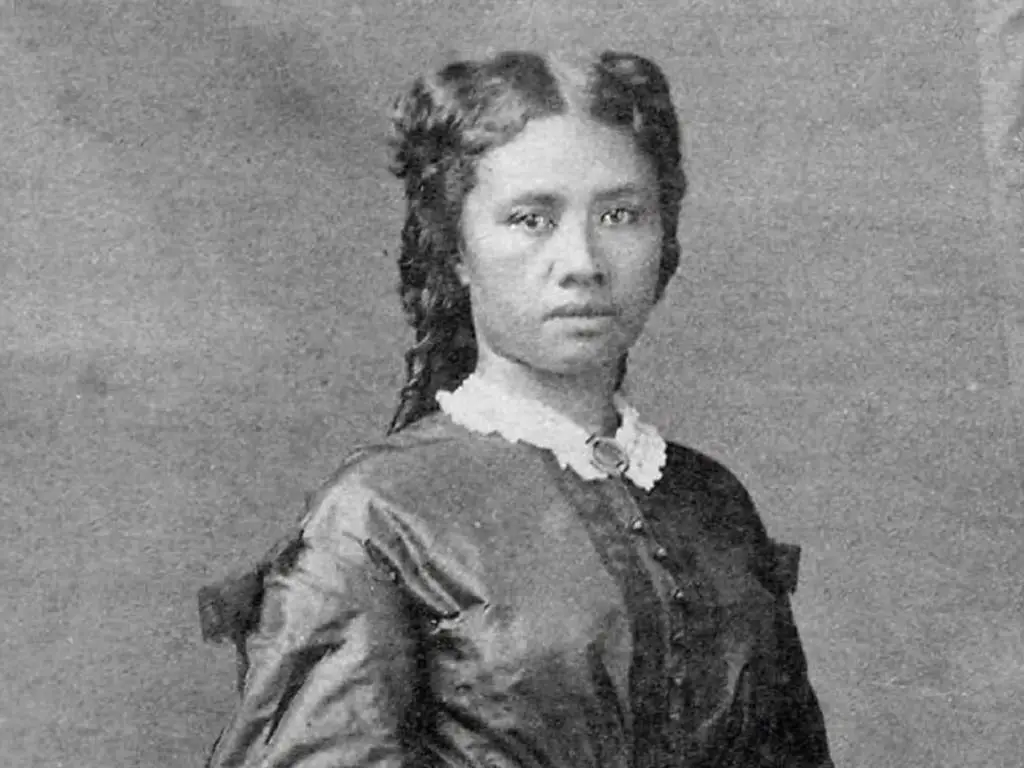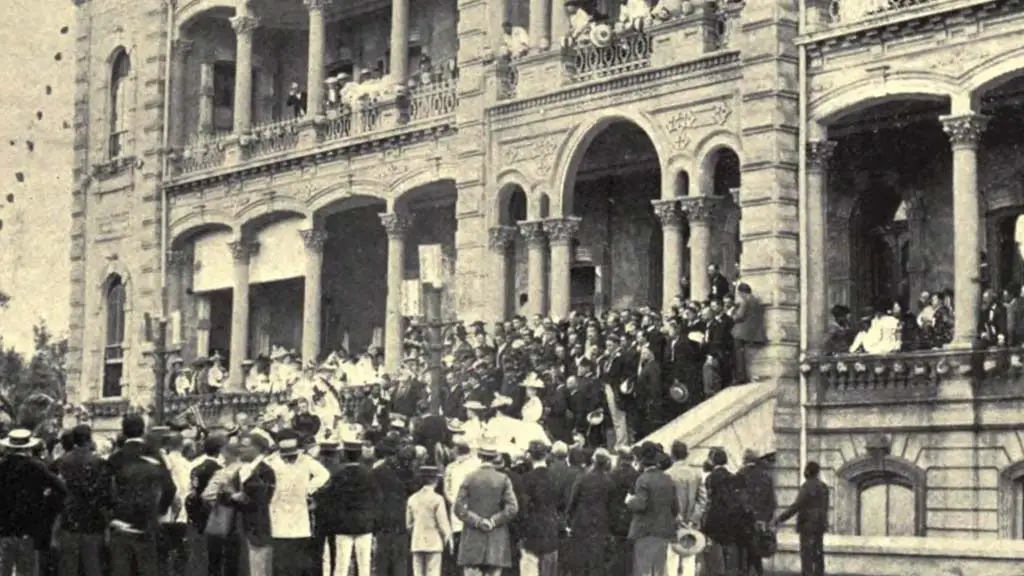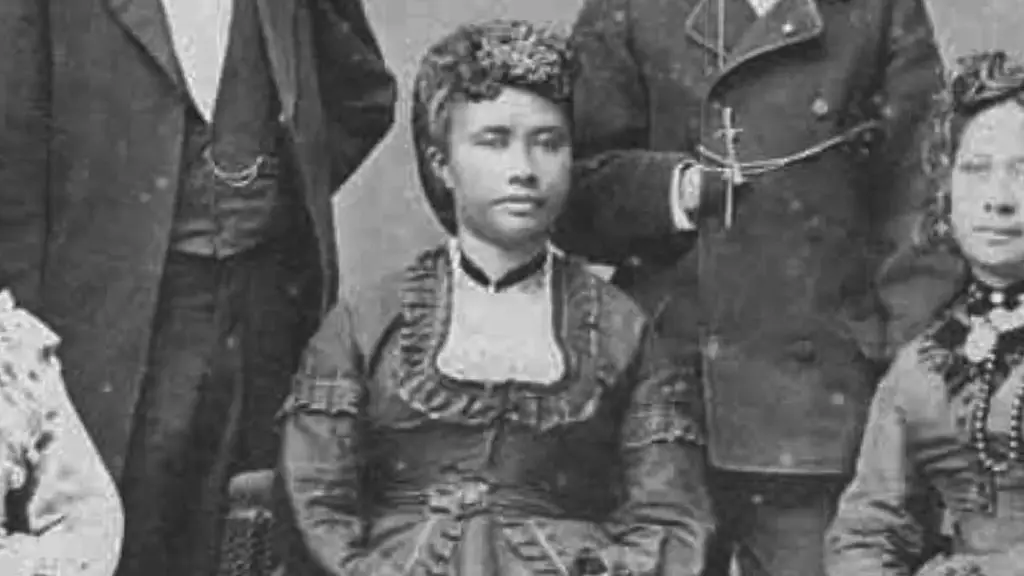Queen Liliuokalani’s journey to Washington, D.C. in 1893 marked a pivotal moment in Hawaiian history and international diplomacy.
As the last sovereign monarch of Hawaii, she undertook this voyage to confront the United States government over the controversial overthrow of her kingdom.
Her visit aimed to challenge the annexation efforts and seek redress for the injustice inflicted upon her people.
In Washington, Liliuokalani engaged in diplomatic negotiations with President Grover Cleveland and other officials, presenting compelling arguments for the restoration of Hawaiian sovereignty.
This historic journey underscored her unwavering commitment to Hawaiian independence and her role as a symbol of resistance against colonialism.
Liliuokalani’s efforts in the U.S. capital left a lasting legacy of advocacy for indigenous rights and sovereignty, inspiring generations to come in their fight for justice and self-determination.
Her visit remains a poignant chapter in the ongoing struggle for cultural preservation and indigenous empowerment.

Significances of Liliuokalani’s Traveling to Washington DC
Queen Liliuokalani’s travel to Washington, D.C. in 1893 holds significant historical importance, reflecting her efforts to challenge the overthrow of the Hawaiian monarchy and seek justice for her people.
Here are the key significances of her visit:
Assertion of Sovereignty
Queen Liliuokalani’s journey to Washington, D.C. in 1893 was a bold assertion of Hawaiian sovereignty amidst the tumultuous political landscape.
As the last reigning monarch of Hawaii, she sought to directly challenge the overthrow orchestrated primarily by American and European settlers.
By traveling to the capital of the United States, Liliuokalani aimed to reaffirm the legitimacy of the Hawaiian monarchy and its right to self-governance.
Her presence in Washington symbolized her refusal to accept the annexation efforts and emphasized Hawaii’s status as an independent kingdom unlawfully disrupted.
Diplomatic Efforts
In Washington, D.C., Queen Liliuokalani engaged in extensive diplomatic efforts to plead her case to U.S. officials, including President Grover Cleveland.
She presented compelling arguments detailing the illegality of the overthrow, highlighting the role of American interests in undermining Hawaiian sovereignty.
Her meetings with influential figures sought to secure their support for the restoration of the monarchy and to reverse the annexation process.
Despite initial sympathies from President Cleveland, political complexities and shifting interests ultimately delayed any effective intervention to restore her reign.
Symbol of Resistance
Queen Liliuokalani’s visit to Washington, D.C. became a powerful symbol of resistance against colonialism and foreign interference.
Her steadfast determination to reclaim her throne and restore Hawaiian sovereignty resonated deeply with the Hawaiian people and indigenous communities worldwide.
Her actions inspired solidarity and activism, galvanizing support for the Hawaiian cause both domestically and internationally.
Liliuokalani’s defiance against the forces of imperialism elevated her to an iconic figure of resistance, embodying the spirit of indigenous rights and the fight against injustice.
Historical Documentation
Liliuokalani’s journey and her subsequent writings provide invaluable historical documentation of her efforts and the political climate of the time.
Her memoir, “Hawaii’s Story by Hawaii’s Queen,” offers a firsthand account of her interactions in Washington, D.C., detailing the challenges she faced and the diplomatic intricacies involved.
These documents serve as primary sources that illuminate the perspectives of Hawaiian sovereignty and the impact of U.S. intervention on the islands.
They provide crucial insights into the legal, political, and personal dimensions of the Hawaiian struggle during this critical period.
Legal and Moral Arguments

During her meetings in Washington, D.C., Queen Liliuokalani articulated compelling legal and moral arguments against the annexation of Hawaii.
She emphasized the principles of justice, legality, and the inherent rights of her people to determine their own destiny.
Her arguments challenged the ethical implications of the U.S. actions and appealed to American values of democracy and self-determination.
Liliuokalani’s advocacy underscored the broader implications of colonialism and highlighted the disparities between rhetoric and actions in U.S. foreign policy towards indigenous peoples.
Legacy of Advocacy
Queen Liliuokalani’s advocacy in Washington, D.C. left a profound legacy that continues to resonate in the ongoing struggles for indigenous rights and sovereignty.
Her courage and resilience in confronting colonial powers inspire contemporary movements for social justice and indigenous empowerment.
Her legacy serves as a reminder of the enduring importance of preserving cultural identity, reclaiming sovereignty, and advocating for the rights of marginalized communities.
Liliuokalani’s story remains a poignant example of leadership and perseverance in the face of adversity, influencing generations of activists and scholars worldwide.
Liliuokalani’s Main Goals in Visiting Washington DC
Queen Liliuokalani’s visit to Washington, D.C. in 1893 was driven by several key goals, reflecting her determination to address the overthrow of the Hawaiian monarchy and advocate for the rights of her people on the international stage.
Here are her main goals:
Seeking Redress and Restoration of Sovereignty

Liliuokalani’s primary goal was to petition the U.S. government, particularly President Grover Cleveland, for the restoration of Hawaiian sovereignty.
She sought to overturn the illegal overthrow orchestrated by American and European settlers with U.S. military support in 1893.
Her aim was to reclaim her rightful position as the constitutional monarch of Hawaii and restore the independent status of the Hawaiian Kingdom.
Negotiating Against Annexation
Anticipating annexation efforts by the United States, Queen Liliuokalani aimed to persuade American officials against the annexation of Hawaii.
She argued against the annexation on legal, moral, and political grounds, emphasizing the illegitimacy of the actions that led to the overthrow of her government.
Her diplomatic efforts were focused on halting the annexation process and preserving Hawaii’s autonomy.
Raising International Awareness and Support
Liliuokalani understood the importance of international opinion and sought to raise awareness about the plight of Hawaii and its people.
By visiting Washington, D.C., she aimed to garner sympathy and support from the international community, particularly from the United States, to pressure the U.S. government into acknowledging the wrongful annexation and to support the reinstatement of Hawaiian sovereignty.
Documenting the Injustice
During her visit, Queen Liliuokalani documented the injustices suffered by her people in her memoir, “Hawaii’s Story by Hawaii’s Queen.”
This literary work served not only to chronicle her personal experiences but also to provide a comprehensive account of the political turmoil in Hawaii and the impact of U.S. intervention.
Her documentation aimed to educate future generations about the Hawaiian struggle for self-determination and the consequences of colonialism.
Preserving Hawaiian Culture and Identity
Beyond political objectives, Liliuokalani’s goals included preserving Hawaiian culture and identity amidst the pressures of American influence.
She saw the preservation of Hawaiian traditions, language, and customs as integral to the survival of her people’s heritage in the face of external forces seeking to assimilate or suppress indigenous cultures.
How Liliuokalani’s Visit Influence Us-Hawaiian Relations

Queen Liliuokalani’s visit to Washington, D.C. in 1893 had a profound and lasting influence on U.S.-Hawaiian relations, shaping diplomatic interactions and historical perceptions for decades to come.
Here’s how her visit impacted these relations:
International Awareness and Sympathy
Liliuokalani’s visit brought international attention to the plight of Hawaii and its people.
Her efforts to highlight the illegal overthrow of the Hawaiian monarchy resonated globally, garnering sympathy for Hawaii’s struggle against American imperial ambitions.
This increased awareness laid the groundwork for ongoing international scrutiny of U.S. actions in Hawaii and influenced perceptions of American foreign policy in the Pacific.
Diplomatic Tensions and Negotiations
The Queen’s diplomatic efforts in Washington, D.C. strained relations between the Hawaiian Kingdom and the United States.
Her appeal for the restoration of Hawaiian sovereignty challenged American claims to territorial expansion and sparked negotiations over the future status of Hawaii.
While initial diplomatic discussions under President Grover Cleveland leaned towards restoration, subsequent administrations shifted towards annexation, heightening tensions between the two nations.
Legal and Political Precedents
Liliuokalani’s visit established legal and political precedents regarding indigenous rights and self-determination.
Her advocacy for Hawaiian sovereignty contributed to evolving international norms on colonialism and indigenous governance, influencing future debates on indigenous rights globally.
The legal arguments she presented against annexation laid the foundation for later legal challenges and discussions surrounding Hawaii’s political status.
Cultural and Identity Preservation
Beyond political implications, Liliuokalani’s visit underscored the importance of preserving Hawaiian culture and identity amidst American assimilation efforts.
Her advocacy for cultural autonomy resonated with indigenous communities worldwide, inspiring movements for cultural preservation and revitalization in Hawaii and beyond.
This cultural legacy continues to shape discussions on indigenous rights and identity in the modern era.
Legacy of Activism and Resistance
Queen Liliuokalani’s visit left a lasting legacy of activism and resistance against colonial oppression.
Her steadfast determination to reclaim Hawaiian sovereignty inspired generations of activists in Hawaii and globally to challenge injustice and advocate for self-determination.
Her legacy serves as a reminder of the ongoing struggle for indigenous rights and sovereignty, influencing contemporary debates on decolonization and indigenous empowerment.
Frequently Asked Questions
Why did Queen Liliuokalani travel to Washington, D.C.?
Queen Liliuokalani traveled to Washington, D.C. in 1893 to protest the overthrow of the Hawaiian monarchy and seek redress from the U.S. government.
Who did Queen Liliuokalani meet with in Washington, D.C.?
During her visit, Liliuokalani met with President Grover Cleveland and other government officials to plead her case for the restoration of Hawaiian sovereignty.
What was the outcome of Queen Liliuokalani’s trip to Washington, D.C.?
While President Cleveland sympathized with her cause initially, political complexities delayed effective action, ultimately leading to the annexation of Hawaii in 1898.
Why is Queen Liliuokalani’s journey significant?
Liliuokalani’s journey symbolizes her resistance against colonialism, advocacy for indigenous rights, and her role as a prominent figure in Hawaiian history.
What documents did Queen Liliuokalani leave behind about her trip?
Queen Liliuokalani documented her experiences and perspectives in her memoir, “Hawaii’s Story by Hawaii’s Queen,” providing valuable insights into the political dynamics of the time.
Conclusion
Queen Liliuokalani’s journey to Washington, D.C. in 1893 stands as a testament to her unwavering dedication to Hawaiian sovereignty and justice.
Despite facing political complexities and ultimately failing to prevent Hawaii’s annexation by the United States, her visit sparked international awareness of Hawaii’s plight and inspired generations of activists.
Liliuokalani’s diplomatic efforts and legal arguments challenged the moral integrity of colonialism, emphasizing the rights of indigenous peoples to self-determination.
Her legacy of advocacy continues to resonate, highlighting the ongoing struggle for cultural preservation and indigenous empowerment worldwide.
As a symbol of resistance against oppression, Queen Liliuokalani’s journey remains a poignant chapter in history, reminding us of the enduring importance of upholding justice and dignity for all peoples.
Her courage and perseverance in the face of adversity serve as an inspiration for those striving for equity, sovereignty, and human rights in contemporary times.




Scott Jung